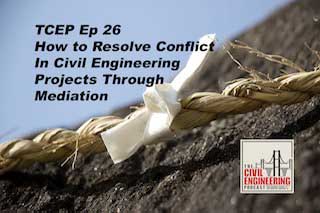Podcast – How to use Mediation in Civil Engineering with the Engineering Career Coach
I am excited to present my podcast interview with the Engineering Career Coach. With over 750,000 podcast downloads, they sought me out to explain how mediation is useful in the civil engineering and construction fields.
Here are the links to the podcast:
Click on the following –
Engineering Career Coach (Web Download)
Here are some key points discussed in this episode of The Civil Engineering Podcast:
Differences between Mediation, Litigation and Arbitration
- Mediation – You come together to craft the solution to the problem with the help of a mediator (may take 1-3 months)
- Litigation – You go to the court and have a judge or jury solve your case (based on the court’s time schedule usually takes 5-6 years to come to resolution)
- Arbitration – A private judging with arbitrators making the final decision and there’s no appeal (you have control over the time schedule)
Five major steps for engineers in the preparation of mediation:
1. Prepare yourself, your expectations, your realities, and your intent. Know what you want to communicate. Know what your goals needs and interests are in a solution. Do a risk benefit analysis of where you’re at in the process. Understand where the best and worst alternatives to negotiate a settlement would be. Develop some settlement scenarios: what can you live with, think outside the box. Recognize that the other side has interests, goals and needs as well.
2. Prepare your attorney. Define your issues with them. Prepare a decision tree. Find out how the attorney wants to represent and showcase you.
3. Prepare the opposition – their attorney, their adjusters, their decision makers.
4. Provide the decision makers all the information of what is really going on, and send copies of the mediation brief to other parties.
5. Prepare the mediator – educate the mediator.
Qualities of a good mediator:
1. Able to build trust and confide in quickly
2. Excellent interpersonal skills
3. Patience and sense of humor
4. Creativity in solving problems
5. Able to think outside of the box
6. Willing to do everything that he/she can to assist a settlement
Finally, almost all disputes are initially communication issues, but mediation can help get the communication going again and help to keep your project back on track.
 About the Author: Ken Strongman (www.kpstrongman.com) has years of experience and a growing national reputation as a mediator and arbitrator. He has successfully resolved more than a thousand disputes in the fields of construction defects, real estate, intellectual property, and employment. He is also a Mediator and Arbitrator for FINRA.
About the Author: Ken Strongman (www.kpstrongman.com) has years of experience and a growing national reputation as a mediator and arbitrator. He has successfully resolved more than a thousand disputes in the fields of construction defects, real estate, intellectual property, and employment. He is also a Mediator and Arbitrator for FINRA.
© 2020 Ken Strongman. All Rights Reserved. Please do not copy or repost without permission.
